牛津深圳版七年级上册Module 2 The natural worl Unit4 Vocabulary课件(共49张PPT)
文档属性
| 名称 | 牛津深圳版七年级上册Module 2 The natural worl Unit4 Vocabulary课件(共49张PPT) | 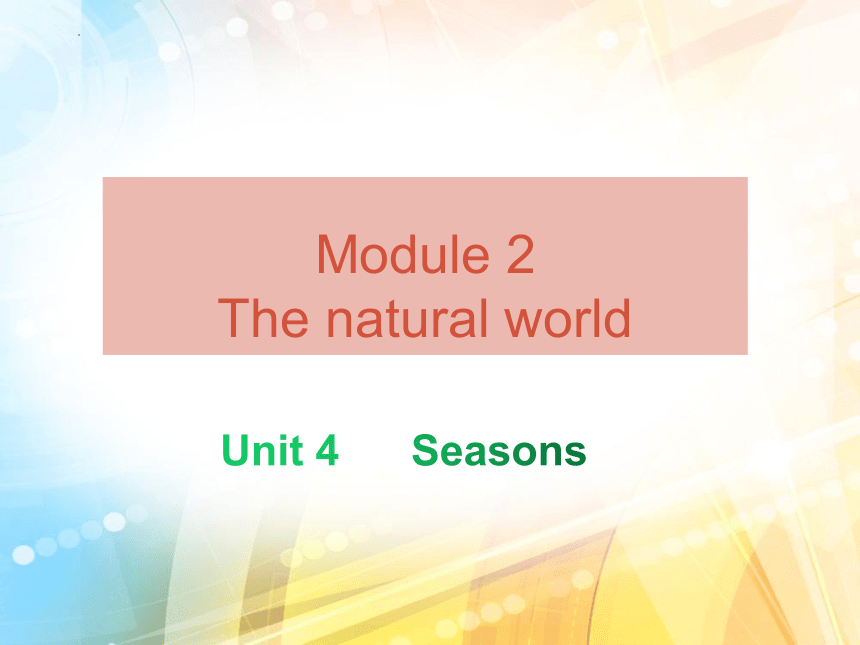 | |
| 格式 | zip | ||
| 文件大小 | 2.3MB | ||
| 资源类型 | 教案 | ||
| 版本资源 | 牛津深圳版 | ||
| 科目 | 英语 | ||
| 更新时间 | 2022-09-11 17:05:00 | ||
图片预览

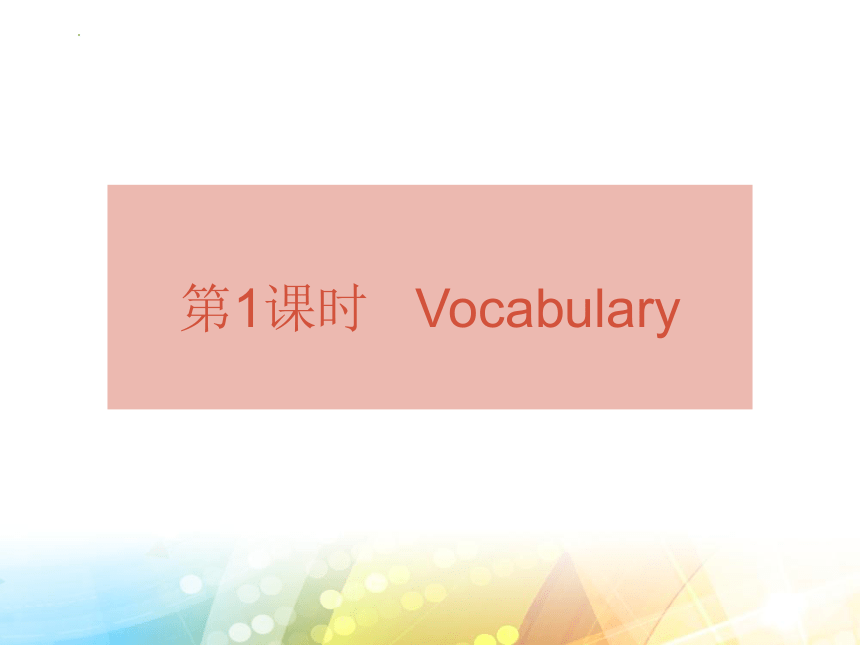
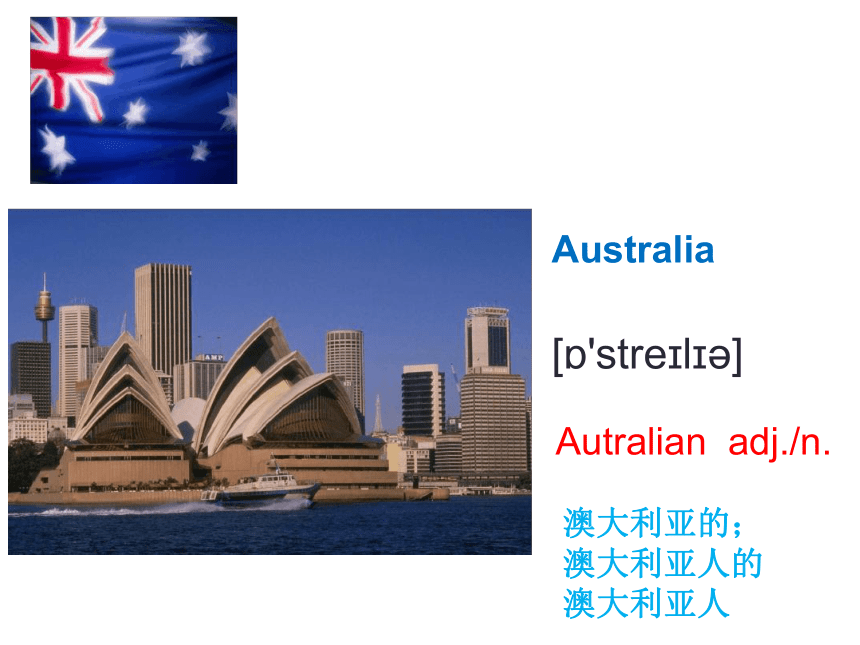
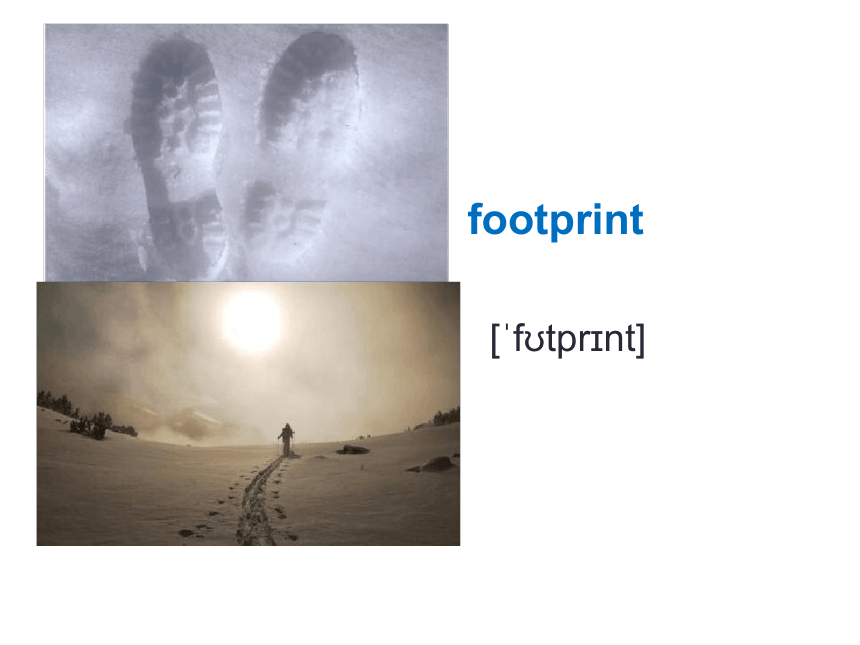
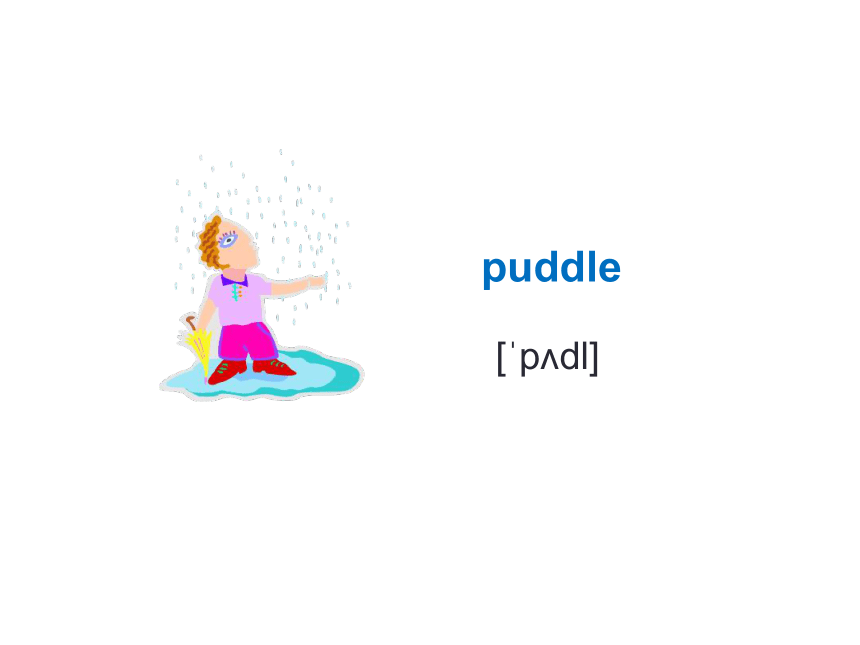

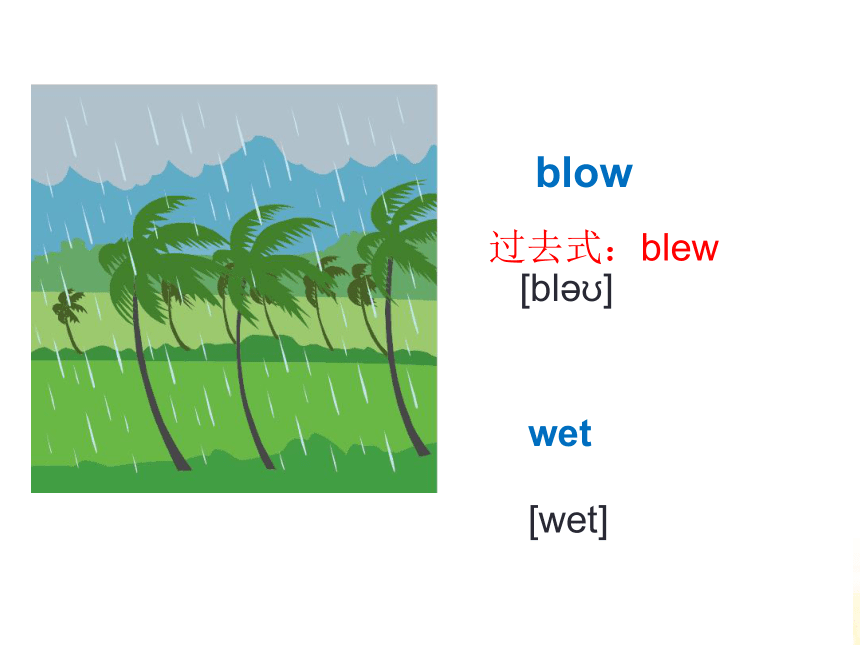
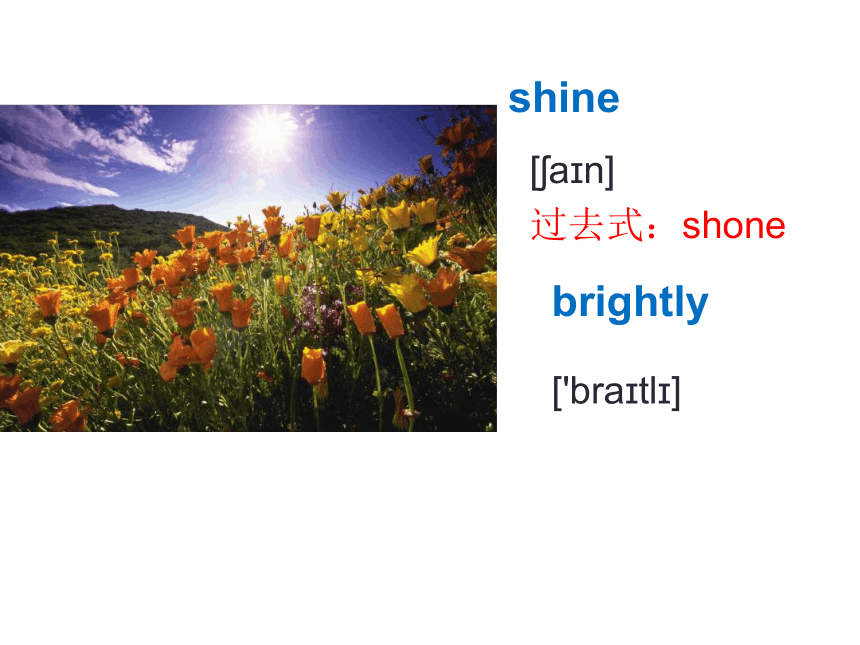
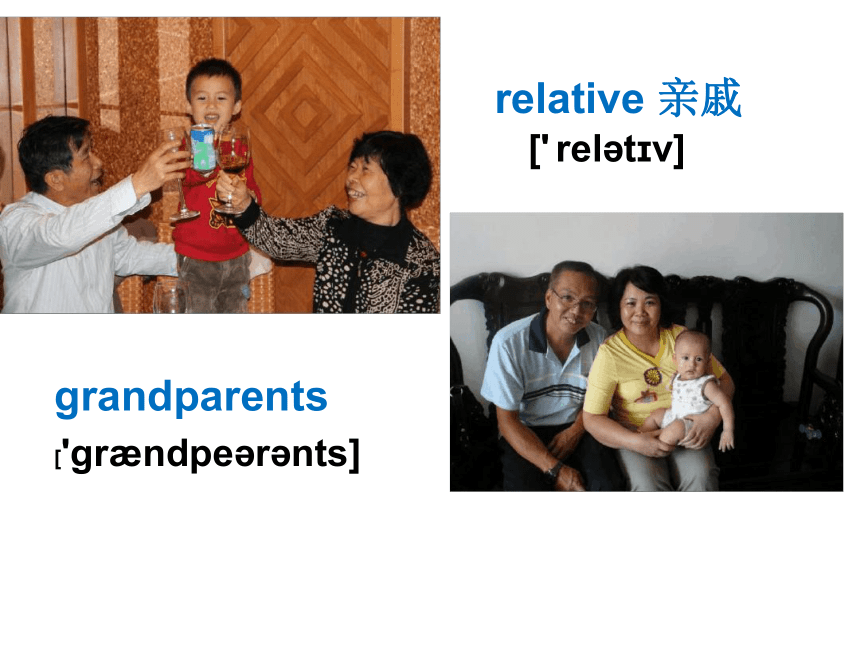
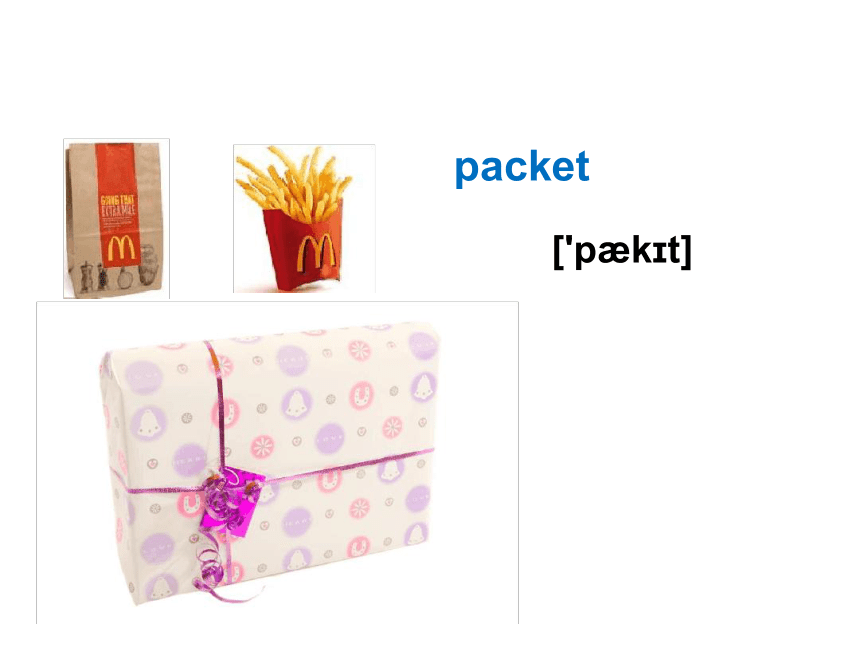
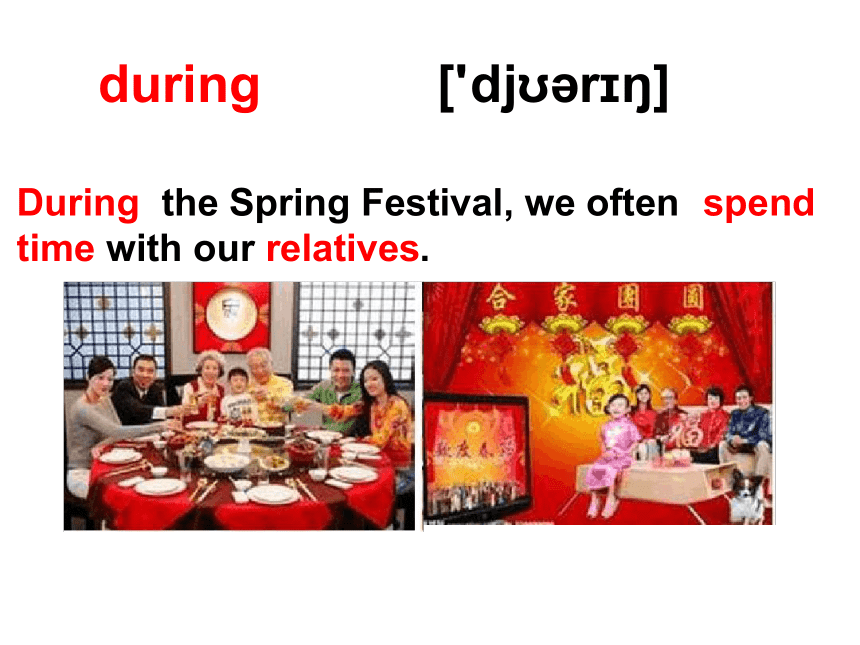

文档简介
(共49张PPT)
Unit 4 Seasons
Module 2
The natural world
第1课时 Vocabulary
Australia
[ 'stre l ]
Autralian adj./n.
澳大利亚的;
澳大利亚人的
澳大利亚人
footprint
[ f tpr nt]
puddle
[ p dl]
town
home town
[ta n]
blow
wet
[bl ]
[wet]
过去式:blew
shine
brightly
[ a n]
['bra tl ]
过去式:shone
[
'gr ndpe r nts]
relative
亲戚
grandparents
['
rel t v]
['p k t]
packet
During
the Spring Festival, we often
spend
time
with our
relatives
.
during
[
'
dj r ]
take a
trip
fly a kite
fly kites
go swimming
kick 可作动词(vt. & vi.)踢;踹
= hit sb/sth with the foot
kick也可以作名词,指“踢;反冲;后座力”。
【要点1】kick
拓展:
kick down 踢倒
kick oneself 自责,懊恼
举例
She kicked the football on the playground.
她在球场上踢足球。
The boy kicks the chair down when he is running. 小男孩在跑的时候踢倒了椅子。
I will kick myself if I fail in the exam. 如果我没有通过考试,我会懊恼的。
应用
(1)我想要和吉姆一起踢球。(根据汉语意思补全句子)
I want to_______ _________ ________ with Jim.
(2)警察为了抓贼把门踢倒了。(根据汉语意思补全句子)
The policeman _______ the door _______ to catch the thief.
kick
kicked
down
the
ball
【要点2】everything
everything pron.
=all the objects=all the things
拓展:
anything 任何事情
nothing 无事,无物
something 某事物
所有事情;一切
举例
She told me everything. 她告诉了我一切。
Everything is OK. 一切都好。
We don't need to do anything about it.
我们对此不需要做任何事情。
I heard nothing. 我什么都没听到。
Would you like to have something to eat 你想吃点什么吗?
nothing
anything
something
everything
nothing
anything
something
everything
应用
(1)( )I am hungry. Please give me something to eat. will do.
A. Everything
B. Something
C. Anything
(2)( )—Wow, so many new buildings! But it used to be a poor village.
—Yes, has changed in our town.
A. nothing B. everything C. somebody
C
B
【要点3】picnic
picnic n. 野炊,野餐
拓展:
go on a picnic
=have a picnic 去野餐
举例
Children went on a picnic and played in a field. 孩子们去野餐,在田野上嬉闹。
It's a nice day. Let's go on a picnic.
今天天气不错,咱们去野餐吧。
Would anyone like to have a picnic
有人想去野餐吗?
应用
( )It is nice to a picnic on the beach.
A. go
B. have
C. do
B
【要点4】snowy
snowy adj. 下雪多的
=with a lot of snow having falllen
snow n. 雪(不可数)
v. 下雪
举例
In Changchun it is often snowy in winter.
在长春,冬天经常下雪。
The snow looks beautiful in the trees. 树上的积雪显得很美。
It had been snowing all night. 整夜一直在下雪。
The story happened on a cold and ____________(snow) day.
应用
snowy
【要点5】spend
spend v. 花(时间、金钱);度过
(1)spend time/money on sth.
在……上花费时间(金钱)
这道数学题花了我两个小时。
I spent two hours on this Maths problem.
2)spend time/money(in)doing sth.
花费时间(金钱)做某事。
造这座桥花了他们两年时间。
They spent two years(in)building this bridge.
人做主语
举例
(3) v. 度过
How do you spend your holiday
你怎么度过你的假期?
应用
(1) I spend the whole morning ___________ (clean) the room.
(2) ( )I _______ 200 yuan for the new skirt.
A. spent B. paid C. cost
(3) ( )The mobile phone _______ me 3,000 yuan.
A. spent
B. paid
C. cost
cleaning
B
C
spend, cost, take和pay的用法区别
1.cost的主语是物或某种活动,还可以表示“值”,常见用法如下:
(1)sth. costs(sb.)+金钱
某物花了(某人)多少钱。
A new computer costs a lot of money.
买一台新电脑要花一大笔钱。
(2)(doing)sth. costs(sb.)+时间
某物(做某事)花了(某人)多少时间。
Remembering these new words cost him a lot of time.
他花了大量时间才记住了这些单词。
注意:cost的过去式及过去分词都是cost,并且不能用于被动句。
2. take后面常跟双宾语,常见用法有以下几种:
(1)It takes sb. +时间+to do sth.
做某事花了某人多少时间。如:
It took them three years to build this road.
他们用了三年时间修完了这条路。
2)doing sth. takes sb. +时间 做某事花了某人多少时间。
Repairing this car took him the whole afternoon.
他花了一下午修车。
3. pay的基本用法是:
(1)pay(sb.)money for sth.
付钱(给某人)买……
I have to pay them 20 pounds for this room each month.
我每个月要付20英镑的房租。
(2)pay for sth. 付……的钱。
I have to pay for the book lost. 我不得不赔丢失的书款。
(3)pay for sb. 替某人付钱。
Don't worry!I'll pay for you.
别担心,我会给你付钱的。
(4)pay sb. 付钱给某人。
They pay us every month.
他们每月给我们报酬。
The book cost me 5 dollars.
这本书花了我五美元。
=I paid 5 dollars for the book.
=I spent 5 dollars on the book.
=I spent 5 dollars (in) buying the book.
It took me two hours to finish my homework.
=I spent two hours on my homework.
=I spent two hours (in) finishing my homework.
我花了两小时完成作业。
课堂练习
一、根据要求写出相应的单词
1. relative _________________(复数形式)
2. Australia _________________(adj.)
3. blow _________________(过去式)
4. shine _________________(现在分词)
5. spend _________________(过去式)
6. snow _________________(adj.)
relatives
Australian
blew
shining
spent
snowy
7. wet _________________(反义词)
8. snowman _________________(复数形式)
9. bright _________________(adv.)
10. kick _________________(过去式)
dry
snowmen
brightly
kicked
Australia
kick
town
Australia
kick
town
picnic
blew
et
ootprints
picnic
blew
et
ootprints
pend
elative
uring
pend
elative
uring
二、词汇
i. 从下面每小题的A、B、C三个选项中选出可以替换画线部分的最佳选项。
( )1. —Look!The golden watch is shining brightly on your hand.
—Yes, it's beautiful and it is a present from my father.
A. giving out light B. blowing
C. showing
( )2. —Which season do you like best
—Spring is my favourite season.
A. best B. lovely C. best-loved
A
C
( )3. —What change can you find in spring
—Everything turns green.
A. No things B. Some things
C. All things
( )4. —Did Cindy have a lot of pocket money with herself
—No, she spent all her money on books.
A. took … to B. paid … for
C. cost … for
C
B
( )5. —Why does your mother not want to live in Beijing
—Because the weather in Beijing is dry.
A. not cloudy
B. not warm
C. not wet
( )6. —When does the weather start to get warm
—In spring.
A. become B. change
C. come
C
A
( )7. —Miss Li is your favourite teacher, isn't she
—Yes, she is very kind and she often talks to us gently.
A. secretly B. softly C. slowly
( )8. —Mom, can we take a trip to Germany this summer holiday
—I am sorry, dear. I am too busy to spend the holiday with you this summer. Can we go to Germany next time
A. travel B. talk C. tall
B
A
ii. 根据句子意思,从下面每小题的A、B、C三个选项中选出恰当的词语完成句子。
( )9. —Where is your son
—He is ___________ the ball with his friends on the playground.
A. flying B. kicking C. blowing
( )10. —How many ___________ do you have
—I don't know it clearly. I really have a big family.
A. relatives B. friends C. managers
B
A
( )11. —Do you have any plan for the coming holiday
—Yes. I would like to time with my family.
A. go B. cost
C. spend
( )12. —How did Bill hurt his leg
—He his bike.
A. fell from B. fell off from C. fell down from
C
C
( )13. —Shall we go out to play badminton
—That is a good idea. This book is so
that I don't want to read it.
A. boring B. good C. bored
( )14. —What did your teacher tell you just now over there
—He said,“If you don't spend much time
sports, you will fail the sports exam.”
A. in B. with C. on
A
C
( )15. —I forgot my mother's birthday!
— You'd better keep it in mind next year.
A. You did
B. I don't mind.
C. I'm afraid so.
A
Unit 4 Seasons
Module 2
The natural world
第1课时 Vocabulary
Australia
[ 'stre l ]
Autralian adj./n.
澳大利亚的;
澳大利亚人的
澳大利亚人
footprint
[ f tpr nt]
puddle
[ p dl]
town
home town
[ta n]
blow
wet
[bl ]
[wet]
过去式:blew
shine
brightly
[ a n]
['bra tl ]
过去式:shone
[
'gr ndpe r nts]
relative
亲戚
grandparents
['
rel t v]
['p k t]
packet
During
the Spring Festival, we often
spend
time
with our
relatives
.
during
[
'
dj r ]
take a
trip
fly a kite
fly kites
go swimming
kick 可作动词(vt. & vi.)踢;踹
= hit sb/sth with the foot
kick也可以作名词,指“踢;反冲;后座力”。
【要点1】kick
拓展:
kick down 踢倒
kick oneself 自责,懊恼
举例
She kicked the football on the playground.
她在球场上踢足球。
The boy kicks the chair down when he is running. 小男孩在跑的时候踢倒了椅子。
I will kick myself if I fail in the exam. 如果我没有通过考试,我会懊恼的。
应用
(1)我想要和吉姆一起踢球。(根据汉语意思补全句子)
I want to_______ _________ ________ with Jim.
(2)警察为了抓贼把门踢倒了。(根据汉语意思补全句子)
The policeman _______ the door _______ to catch the thief.
kick
kicked
down
the
ball
【要点2】everything
everything pron.
=all the objects=all the things
拓展:
anything 任何事情
nothing 无事,无物
something 某事物
所有事情;一切
举例
She told me everything. 她告诉了我一切。
Everything is OK. 一切都好。
We don't need to do anything about it.
我们对此不需要做任何事情。
I heard nothing. 我什么都没听到。
Would you like to have something to eat 你想吃点什么吗?
nothing
anything
something
everything
nothing
anything
something
everything
应用
(1)( )I am hungry. Please give me something to eat. will do.
A. Everything
B. Something
C. Anything
(2)( )—Wow, so many new buildings! But it used to be a poor village.
—Yes, has changed in our town.
A. nothing B. everything C. somebody
C
B
【要点3】picnic
picnic n. 野炊,野餐
拓展:
go on a picnic
=have a picnic 去野餐
举例
Children went on a picnic and played in a field. 孩子们去野餐,在田野上嬉闹。
It's a nice day. Let's go on a picnic.
今天天气不错,咱们去野餐吧。
Would anyone like to have a picnic
有人想去野餐吗?
应用
( )It is nice to a picnic on the beach.
A. go
B. have
C. do
B
【要点4】snowy
snowy adj. 下雪多的
=with a lot of snow having falllen
snow n. 雪(不可数)
v. 下雪
举例
In Changchun it is often snowy in winter.
在长春,冬天经常下雪。
The snow looks beautiful in the trees. 树上的积雪显得很美。
It had been snowing all night. 整夜一直在下雪。
The story happened on a cold and ____________(snow) day.
应用
snowy
【要点5】spend
spend v. 花(时间、金钱);度过
(1)spend time/money on sth.
在……上花费时间(金钱)
这道数学题花了我两个小时。
I spent two hours on this Maths problem.
2)spend time/money(in)doing sth.
花费时间(金钱)做某事。
造这座桥花了他们两年时间。
They spent two years(in)building this bridge.
人做主语
举例
(3) v. 度过
How do you spend your holiday
你怎么度过你的假期?
应用
(1) I spend the whole morning ___________ (clean) the room.
(2) ( )I _______ 200 yuan for the new skirt.
A. spent B. paid C. cost
(3) ( )The mobile phone _______ me 3,000 yuan.
A. spent
B. paid
C. cost
cleaning
B
C
spend, cost, take和pay的用法区别
1.cost的主语是物或某种活动,还可以表示“值”,常见用法如下:
(1)sth. costs(sb.)+金钱
某物花了(某人)多少钱。
A new computer costs a lot of money.
买一台新电脑要花一大笔钱。
(2)(doing)sth. costs(sb.)+时间
某物(做某事)花了(某人)多少时间。
Remembering these new words cost him a lot of time.
他花了大量时间才记住了这些单词。
注意:cost的过去式及过去分词都是cost,并且不能用于被动句。
2. take后面常跟双宾语,常见用法有以下几种:
(1)It takes sb. +时间+to do sth.
做某事花了某人多少时间。如:
It took them three years to build this road.
他们用了三年时间修完了这条路。
2)doing sth. takes sb. +时间 做某事花了某人多少时间。
Repairing this car took him the whole afternoon.
他花了一下午修车。
3. pay的基本用法是:
(1)pay(sb.)money for sth.
付钱(给某人)买……
I have to pay them 20 pounds for this room each month.
我每个月要付20英镑的房租。
(2)pay for sth. 付……的钱。
I have to pay for the book lost. 我不得不赔丢失的书款。
(3)pay for sb. 替某人付钱。
Don't worry!I'll pay for you.
别担心,我会给你付钱的。
(4)pay sb. 付钱给某人。
They pay us every month.
他们每月给我们报酬。
The book cost me 5 dollars.
这本书花了我五美元。
=I paid 5 dollars for the book.
=I spent 5 dollars on the book.
=I spent 5 dollars (in) buying the book.
It took me two hours to finish my homework.
=I spent two hours on my homework.
=I spent two hours (in) finishing my homework.
我花了两小时完成作业。
课堂练习
一、根据要求写出相应的单词
1. relative _________________(复数形式)
2. Australia _________________(adj.)
3. blow _________________(过去式)
4. shine _________________(现在分词)
5. spend _________________(过去式)
6. snow _________________(adj.)
relatives
Australian
blew
shining
spent
snowy
7. wet _________________(反义词)
8. snowman _________________(复数形式)
9. bright _________________(adv.)
10. kick _________________(过去式)
dry
snowmen
brightly
kicked
Australia
kick
town
Australia
kick
town
picnic
blew
et
ootprints
picnic
blew
et
ootprints
pend
elative
uring
pend
elative
uring
二、词汇
i. 从下面每小题的A、B、C三个选项中选出可以替换画线部分的最佳选项。
( )1. —Look!The golden watch is shining brightly on your hand.
—Yes, it's beautiful and it is a present from my father.
A. giving out light B. blowing
C. showing
( )2. —Which season do you like best
—Spring is my favourite season.
A. best B. lovely C. best-loved
A
C
( )3. —What change can you find in spring
—Everything turns green.
A. No things B. Some things
C. All things
( )4. —Did Cindy have a lot of pocket money with herself
—No, she spent all her money on books.
A. took … to B. paid … for
C. cost … for
C
B
( )5. —Why does your mother not want to live in Beijing
—Because the weather in Beijing is dry.
A. not cloudy
B. not warm
C. not wet
( )6. —When does the weather start to get warm
—In spring.
A. become B. change
C. come
C
A
( )7. —Miss Li is your favourite teacher, isn't she
—Yes, she is very kind and she often talks to us gently.
A. secretly B. softly C. slowly
( )8. —Mom, can we take a trip to Germany this summer holiday
—I am sorry, dear. I am too busy to spend the holiday with you this summer. Can we go to Germany next time
A. travel B. talk C. tall
B
A
ii. 根据句子意思,从下面每小题的A、B、C三个选项中选出恰当的词语完成句子。
( )9. —Where is your son
—He is ___________ the ball with his friends on the playground.
A. flying B. kicking C. blowing
( )10. —How many ___________ do you have
—I don't know it clearly. I really have a big family.
A. relatives B. friends C. managers
B
A
( )11. —Do you have any plan for the coming holiday
—Yes. I would like to time with my family.
A. go B. cost
C. spend
( )12. —How did Bill hurt his leg
—He his bike.
A. fell from B. fell off from C. fell down from
C
C
( )13. —Shall we go out to play badminton
—That is a good idea. This book is so
that I don't want to read it.
A. boring B. good C. bored
( )14. —What did your teacher tell you just now over there
—He said,“If you don't spend much time
sports, you will fail the sports exam.”
A. in B. with C. on
A
C
( )15. —I forgot my mother's birthday!
— You'd better keep it in mind next year.
A. You did
B. I don't mind.
C. I'm afraid so.
A
